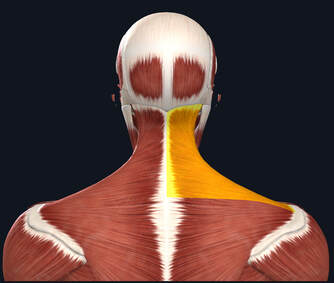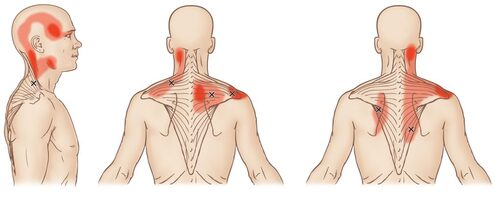|
When I was in college, there was a wellness fair with a massage station tucked away in the corner of the cafeteria. I waited patiently for my turn and when it came, the therapist introduced herself to me and asked me if there were any areas I wanted her to work on. I had never received a professional massage before, so I just shrugged and told her to focus on wherever she thought was the best. She smiled and had me sit and put my face in the hole in the massage chair. When she felt my shoulders, she recoiled in horror and called her colleague over to feel my muscles as well. "WHAT are you doing to yourself??!" they asked. The fact is, is that I was on the computer, playing the violin and piano and texting for hours upon hours during the day. I had build up so much tension, but I didn't even realize it. Allow me to introduce you to our friend, the Upper Trapezius: This broad muscle attaches from the base of your skull, extending down the spine and out through the upper border of your shoulder blade. It's part of It's responsible for controlling your head and neck. What's more important, is that it's a common muscle to exhibit tightness as a result in poor posture, stress or anxiety. The upper traps can also contribute to neck pain, headaches or pain in the shoulder blade. These tender areas are commonly referred to as "trigger points", which we will discuss in a future post. Here are 3 things that you can do to help improve the tightness of these muscles.
If you have any pain that persists or not sure how to stretch, make sure you seek help from a physical therapist or medical professional for the best guidance.
Until next time, stay happy and healthy! 3/28/2021 01:58:55 am
Reply
2/1/2022 06:59:09 pm
I never knew that therapists can help provide muscle strengthening for patients. My cousin, who is an athlete, told me that he is looking for therapy for his shoulder injury and asked if I could advise him on the best option. Thanks to this helpful article, I'll make sure to tell him that it'll be much better if we contact a reputable physical therapy treatment, as they'll be able to answer all of his questions. https://integratedproviders.com/integratedproviders/PhysicalTherapy.aspx
Reply
3/30/2022 03:24:36 am
Usually, a stiff neck results from a minor injury or incident. People can often relieve the stiffness at home. In rare cases, however, it can be a sign of a serious illness that requires medical treatment.
Reply
1/4/2023 01:27:29 pm
Thanks so much for the tips to help people avoid neck and back pain. I sit at my desk a lot and I've been struggling with neck pain for a while. I've been looking into going in to see a physical therapist who can help me create stretches that target my problem areas.
Reply
I never realize that advisors can assist with giving muscle reinforcing to patients. My cousin, who is a competitor, let me know that he is searching for treatment for his shoulder injury and inquired as to whether I could prompt him on the most ideal choice. Because of this supportive article, I'll make a point to let him know that it'll be greatly improved on the off chance that we contact a trustworthy exercise based recuperation treatment, as they'll have the option to respond to his inquiries in general. https://integratedproviders.com/integratedproviders/PhysicalTherapy.aspx
Reply
2/21/2023 02:37:05 am
Arthroscopy is an advanced procedure widely used in orthopedic medicine to look inside joints. This procedure is minimally invasive and is performed through a small incision. The arthroscopy procedure involves the use of an arthroscope, an instrument with a small lens and a light system, which is inserted through the incision to see the inside of the...
Reply
5/5/2023 12:11:23 am
This blog post highlights the importance of self-care and how we often neglect it in our busy lives. The author's experience at a wellness fair is a great reminder to pay attention to our bodies and take care of ourselves. The story of the massage therapist's shock at the author's tense muscles due to computer and instrument use is relatable to many of us. Overall, a great read with an important message.
Reply
Leave a Reply. |
AuthorDr. Janice Ying is a Los Angeles-based Physical Therapist. She is board-certified Orthopedic Physical Therapy Specialist and is regarded as a leading expert in the field of Performing Arts Medicine and the development of cutting edge injury prevention and rehabilitation programs for musicians. DisclaimerThe information on this website is intended for educational purposes and should NOT be construed as medical advice. If you have or think you have a health-related issue which needs to be addressed, please seek the help from your local licensed medical professional.
Archives
October 2020
Categories
All
|
We would love to see you soon!
|
© Opus Physical Therapy and Performance - 2021 - All Rights Reserved



 RSS Feed
RSS Feed